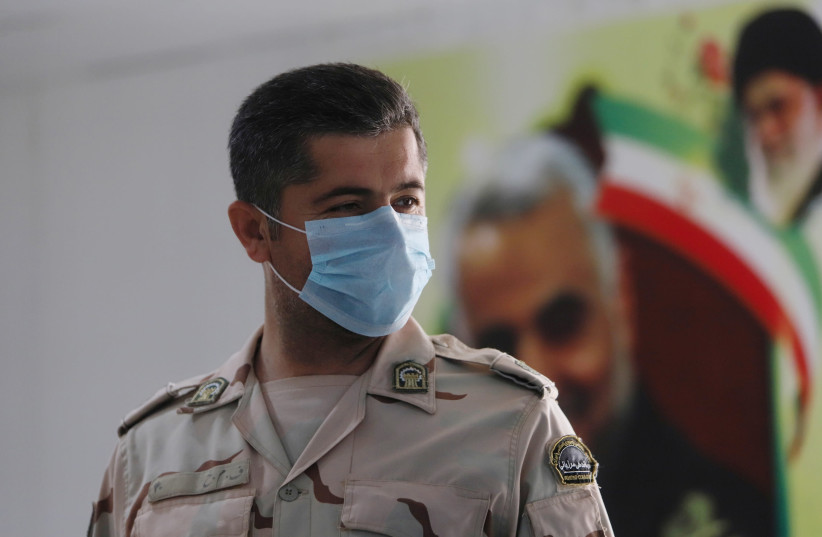Coronavirus hits terrorists hardest from ISIS to Iran – analysis
After sanctions and military threats, the coronavirus may be the first factor that can slow Iran’s march toward a nuclear weapon.
By YONAH JEREMY BOB
MARCH 17, 2020 20:43

Amid all the chaos caused by the coronavirus tidal wave, it may also rid the world of many of its worst terrorists or at least freeze their activity.
There are no statistics for how it is impacting ISIS supporters and will be none as the group would never report negative data and has no connections to international groups like the WHO or the civilized world.
But ISIS’s stunning recent order to its followers to stay away from Europe means not only that it is afraid of future infection if its agents go there, but that its network of followers there is likely already being hit.
This would make lots of sense since ISIS members tend to be disconnected from the Western world and could have gone longer ignoring the dangers of infection than average people.
Furthermore, ISIS members would be wary of accepting medical assistance from the authorities in their host countries as their faces may already be on the wanted list.
Iran is the paradigm case of a regime sponsoring terrorism which is known to be getting hit harder than any other countries besides China and Italy.
The Islamic Republic is notoriously dishonest about numbers which can hurt its public relations.
So when on Tuesday its official count of dead reached close to 1,000 and over 14,000 persons infected, the real numbers are likely to be far higher.
Most significantly, top Iranian leaders, including an ayatollah, ministers and senior Islamic Revolutionary Guard Corps officials have been killed and infected by the coronavirus.
In that vein, much of Iran’s top leadership, including Supreme leader Ayatollah Ali Khamenei (who incidentally has not been seen during the crisis), are in the more endangered “elderly” category.
Some commentators have speculated that even after the coronavirus wave passes, Tehran may change some of its policies and colors because some of its key elderly old guard members may be dead.
Can Iran continue to enrich uranium at the same rate as scientists undoubtedly get infected and quarantines waylay others?
After sanctions and military threats, the coronavirus may be the first factor which can slow the regime’s march toward a nuclear weapon.
Israeli officials have also said that both the spread of the virus in parts of Syria, and Tehran generally being distracted by the internal crisis, have at least temporarily halted efforts to export its war machine against Israel into Syrian territory.
Iran is also having a much harder time fighting the coronavirus because years of sanctions caught the country at its weakest and most undersupplied point economically and medically.
Of course, the flip side of a country where there are many backwards attitudes toward science and medicine (one reason for the spread was Qom religious leaders urging followers to visit to receive blessings right as Qom became greatly infected) is that the regime may be more ready to suffer.
Israeli intelligence officials have noted that even if much larger numbers of people die in Iran, China or another country with strong regime control, the governments may be more impervious to public discontent.
Outbreaks of coronavirus have started to surface in Somalia where large portions of the country are under control of the al-Qaeda-linked al-Shabab armed group.
Once again, this terror group’s’ control and quantity of forces to maintain its reign of terror may be hit harder than other areas because of the lack of assistance and connections with the WHO and other Western countries who could help.
The same will likely be true for al-Qaeda in general in any country where it is trying to control territory and mixed in with the wider population.
The only wings of al-Qaeda which may fair better than Western societies could be wings where they were not infected during the initial stage and their extreme isolation from wider circles renders them more impervious to infection.
Coronavirus has not yet had a major impact on Gaza, but Hamas’s fear of it getting out of control has largely halted attempts to provoke Israel.
There was one recent small attack from Gaza and a minor Israeli response.
Top Hezbollah officials have reportedly been infected with the coronavirus during a visit by their Iranian sponsors. Hezbollah leader Hassan Nasrallah may be among them.
Like Hamas, Hezbollah is working to fight the virus and maintain order within Lebanon, leaving little time to fight Israel.
Terror groups worldwide without a state apparatus to fall back on will probably be hit hardest, potentially giving the world some time period of reprieve.
States and quasi-state entities like Iran, Hezbollah and Hamas will likely weather the storm, but their hostilities against Israel are likely to be halted, and the Islamic Republic may even see longer-term policy shifts if the virus takes down more higher-ups of the regime.
Content retrieved from: https://www.jpost.com/Middle-East/Coronavirus-hits-terrorists-hardest-from-ISIS-to-Iran-analysis-621336?fbclid=IwAR150Y2ElP9P8L0iMijcI-Bri1fg8UhGgcb76ogRdAPw163Un4UQzsonFNE.